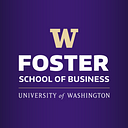UW Foster Faculty Spotlight: Ryan Fehr
Written By: Sohara Shachi
Get to know Foster’s Professor of Management and Michael G. Foster Endowed Fellow, who teaches the core MBA course Ethical Leadership.
What excites you about your subject — ethical leadership?
There are many things that excite me about ethical leadership and the opportunity to teach it. I think what excites me the most is the opportunity to help students think broadly about their professional journeys, and what they hope those journeys will look like. On the first day of class, I say that my hope for everyone is a life they can look back on and be proud of. And that’s really what ethics is all about — thinking carefully about your own values, and doing your best to live a life that is consistent with them.
Which factors influenced your decision to join UW Foster?
When I was on the job market, my main goals were to find a school filled with smart people dedicated to learning, and a location where my family and I could grow and thrive. I was beyond lucky to be offered a position at UW soon after graduating from my PhD program. I accepted the offer right away, and haven’t looked back since!
What do you find meaningful about your time thus far at Foster?
Now that I’ve been here for over a decade, it’s deeply satisfying and meaningful to track students’ careers after graduation, and see all the ways they are making a difference in the world.
How does your work align with Foster’s purpose? Purpose statement:
Together
…We Foster Leaders;
We Foster Insights;
We Foster Progress
…To Better Humanity.
In our ethics class, we spend a lot of time thinking about what we can do in our careers to better humanity. Sometimes, we’re given opportunities to create shared value for everyone involved in a particular initiative or decision, and we can use our skills to “grow the pie.” Other times, we’re faced with a decision that pits what is expedient against what is best for humanity, and we need to muster up the courage to stand up for our values. In ethical leadership, we learn that our capacity to handle these challenges is about more than just good intentions. We need to build the skills necessary to know how to have a positive impact, even when it’s difficult.
How have you worked to make your classroom/course curriculum inclusive?
Inclusion has always been central to the ethics curriculum, but it is particularly important to ensure that the course curriculum is aligned with the issues that managers are facing today. For example, last year we added a session on diversity and AI, which allows us to explore the ways in which algorithms can work against our goals for building inclusive workplaces, and how to deal with those challenges.
Any favorite memories from your experience with Full-time MBAs/Evening MBAs?
My favorite time of the year is graduation season. I never get tired of all of the joy, laughter, hugs, and sense of accomplishment that comes with finishing a rigorous and impactful MBA program. Even thinking about it while writing this makes me smile!
How have you supported students outside the classroom?
I recently worked with a student who was looking to get into the travel industry to secure an internship at a major online travel agency. We discussed the student’s application materials, connected the student with a current manager at the organization, and deliberated about interview tactics. The student ultimately secured the position and is on their way to a wonderful career.
How is your teaching influenced by instructional best practices?
I think of ethics as both an art and a science. First, I take the science of ethics very seriously. Every year, I review the data and make sure that the best practices I teach in the classroom are supported by the available research. Second, I take the art of ethics very seriously. While the data are useful, ethics can’t be reduced to a regression equation. Ultimately, ethical decisions are best made in consultation with all of the relevant stakeholders, ensuring that everyone’s voices are heard. For this reason, we emphasize group discussion and try to get everyone thinking about the challenging dilemmas and issues we discuss.
Are you currently doing work outside of Foster that influences what happens in the classroom?
My main area of research focuses on gratitude, and how to build cultures of gratitude and appreciation in the workplace. I bring this work into the classroom directly by discussing the value of showing gratitude at work, and indirectly by always focusing on the development of high-quality relationships within the MBA program.
How will students apply the knowledge / skills they gain in your classroom in their careers?
Ethics is going to be an important part of your career, whether you want it to be or not! The skills we learn in ethical leadership help prepare you for the inevitable dilemmas, challenges, and conflicts that you will face in your career from day one. In the long run, the skills learned in the class will help you lead with your values, and build a career you can look back on with pride.
What advice do you have for students to ace your course?
The most important things for students to bring to the classroom in ethical leadership are an open mind and a willingness to listen. A lot of the most important learnings from our class come from learning how other people feel about challenging topics, and building empathy for different perspectives on a particular topic.
Ryan with spouse Jinna and their 5 year old daughter Hanna
Originally published at https://blog.foster.uw.edu on October 30, 2023.
